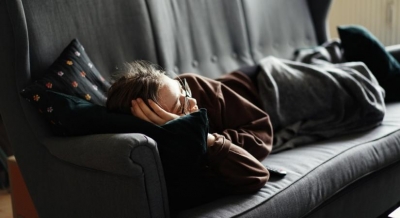Researchers link disturbed sleep with long Covid breathlessness
By IANS | Published: April 16, 2023 11:06 AM2023-04-16T11:06:05+5:302023-04-16T11:20:17+5:30
New Delhi, April 16 If you are facing breathless episodes after Covid during the day, also check if ...

Researchers link disturbed sleep with long Covid breathlessness
New Delhi, April 16 If you are facing breathless episodes after Covid during the day, also check if you are not able to sleep properly as researchers have now discovered that the disturbed sleep patterns in patients hospitalised with Covid was likely to be a driver of breathlessness.
The study of patients in 38 institutions across the UK, led by University of Manchester and Leicester found that 62 per cent of Covid patients had sleep disruption, which was likely to persist for at least 12 months.
The study, published in The Lancet Respiratory Medicine, has highlighted for the first time the association between two post-Covid condition symptoms: breathlessness and sleep disruption.
On average, participants who had been hospitalised with Covid-19 slept for over an hour longer, but their sleep patterns were less regular (19 per cent decrease on the sleep regularity scale), than matched participants who were hospitalised due to any cause.
The researchers also found that participants with sleep disturbance were more likely to have anxiety and muscle weakness, common post-Covid-19 condition symptoms.
"The study has discovered that sleep disturbance could be an important driver of post-Covid breathlessness - or dyspnoea - because of its associations with reduced muscle function and anxiety," said Dr John Blaikley, a clinical scientist from the University of Manchester and respiratory doctor.
The sleep disruption was likely to drive breathlessness directly, but that reduced muscle function and increased anxiety, both recognised causes of breathlessness, could partially mediate the association between sleep disturbance and breathlessness.
The authors speculate that targeting sleep disruption by reducing anxiety and improving muscle strength in these patients could alleviate breathlessness, but further investigation is needed.
Understanding the causes of breathlessness is complex since it can arise from conditions that affect the respiratory, neurological, cardiovascular, and mental health systems.
Disclaimer: This post has been auto-published from an agency feed without any modifications to the text and has not been reviewed by an editor
Open in app